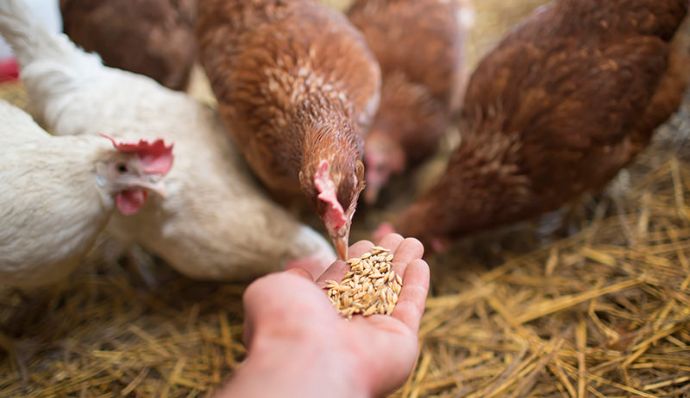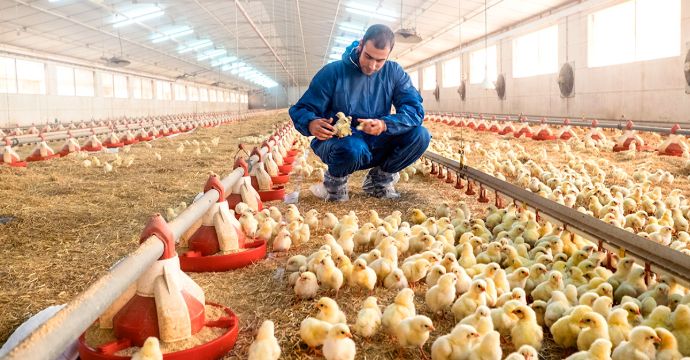
Poultry Feed Medicine: Types of antibiotics for domestic birds
Several types of medication are available for preventing or treating diseases in domestic birds. Antibiotic is the common medicine that is added to the poultry feed. Providing domestic birds with antibiotics aids in maintaining health and improve productivity.
Besides antibiotics, coccidiostats are another common medicine mixed in poultry feed to prevent coccidiosis. Coccidiosis is a common disease found in chickens that are spread from chicken to chicken, therefore it is very necessary to examine poultry regularly. Make a schedule for check-ups. Accordingly, take chicken for regular check-ups. A vet can give you a report regarding the chickens’ health, and also suggest you with some trick to raise chicken.
Antibiotics
Antibiotics are drugs that kill bacteria, which aids in improving the health of domestic birds. Basically, a certain amount of antibiotic is mixed with poultry feed to cure infected domestic birds. It’s always better to consult with the veterinarian before providing any medications.
However, antibiotics are usually added in a lower amount to prevent minor diseases, improve productivity, and promote the health of domestic birds. Some antibiotics are given by mixing in water or directly injecting into the body of domestic birds.
Many poultry farmers don’t use any medicine in poultry feed. However, neglecting regular veterinary checkups can harm the health of domestic birds. Appropriate medicines must be used in poultry feed to restore and maintain the health of domestic birds.
You can find many types of antibiotics that go well with poultry feed and are effective for the health of domestic birds. You can also find different types of antibiotics that treat the same disease with different mechanisms.
The antibiotics mentioned below can be provided under the supervision of a veterinarian.
Antibiotics: Poultry feed medicine to treat disease in domestic birds
Penicillins
Penicillins kill bacteria by preventing the formation of the bacterial cell wall. When this medicine is provided to domestic birds by mixing with poultry feed, the wall breaks down and releases the contents of the cell. They are effective in treating sinusitis and chronic respiratory disease in poultry.
However, make sure to contact your veterinarian before giving penicillins because some poultry may get side effects. Kidney injury, hearing impairment, and vestibular toxicity are the side effects of penicillins.
Cephalosporins
Cephalosporins are similar to penicillins that interfere in bacterial cell formation. This antibiotic is divided into first, second, and third generations, where each generation has a different activity than others. Cephalosporin medicine can be used in any poultry feed after consulting with a veterinarian.
Using cephalosporins medicine in poultry feed can prevent disease in domestic birds as well as cattle. Providing cephalosporin drugs in unapproved doses can negatively impact the health of poultry and cattle. Therefore, always give the exact dose of cephalosporins and do a regular checkup to record improvement.
Glycopeptides
Glycopeptides are essential to maintain health and improve the function of the body. They are effective in protecting various organs helping in preventing poultry from diseases. Glycopeptides interfere with cell wall formation and the production of proteins.
Ionophores
Ionophores are used as anti-microbial but can also control some bacteria, so they are considered antibiotics. However, Ionophores are not used in the making of human medicine, but they are actively used in animal medicine.
This medicine is primarily used in the poultry feed of broiler because it can easily get infected by coccidiosis disease. Ionophores can be used as feed additives to prevent coccidiosis in poultry.
Fluoroquinolones
Fluoroquinolones are broad-spectrum bactericidal drugs. This medicine prevents bacteria from entering DNA and prevents bacteria from multiplying, thus aids in promoting a healthy body. Fluoroquinolones are effective against salmonellosis, colibacillosis, fowl cholera, and Pseudomonas aeruginosa infection.
Lincosamides
Lincosamides are the antibacterial medicine that promotes the health of tissues and bones in domestic birds. This medicine is effective against bone and joint infections. Moreover, Lincosamides is also impactful in necrotic enteritis.
Including Lincosamides in poultry feed of mature and growing domestic birds can help strengthen bones and improve productivity.
Sulfonamides
Sulfonamides are impactful against a broad spectrum of pathogens. They promote RNA and DNA, which are essential in the growth of cells and replication. Moreover, they are also effective for staphylococcus species, streptococcus species, Pasteurella, and salmonella.
Tetracyclines
Tetracyclines act as broad-spectrum bacteriostatic agents that prevent bacteria from multiplying while the immunity system deals with the original infection. They are effective for Mycoplasma, chlamydia, and some protozoa.
Why are antibiotics essential for chicken?
Antibiotics are not harmful unless they are given in an appropriate dose. Feeding broiler and layer chickens with the right antibiotics help keep chickens healthy and reduces bacteria entering the food chain. Consuming eggs and meat of the chicken treated with antibiotics is safe.
Antibiotics ensure to prevent and treat diseases in chickens, however, they don’t promote growth. Though antibiotics are commonly used in animal husbandry with the intention to improve health and productivity, it’s beneficial only when given in the right amount.
There are reasons why farmers are actively giving antibiotics to chickens.
Promotes the health of the chicken
Treating chickens with antibiotics protects them from bacterial infection. So, the product from chickens treated with antibiotics is completely safe to consume. Many people believe that consuming products from those chickens is not safe because they are also consuming medicine along with it. But that’s not how it works. In reality, many safeguards are taken to ensure safety. Before chicken meat or chicken eggs are sent to the market, proper examinations ensure safety.
It is safe to consume chickens that are treated with antibiotics than chickens that aren’t treated with antibiotics.
Prevent chicken from diseases
Even though you take good care of the chickens, they can get sick. Chickens can get bacterial infections, which may result in pain and suffering. To avoid bacterial infection in chickens, you can add antibiotics in poultry feed after consulting with a veterinarian. If your chickens are suffering from bacterial infection, better to contact a veterinarian than treat them yourself. Having an expert by your side always benefits when a problem arises.
Knowing the exact dose of antibiotics helps in maintaining the health of chickens as well as minimize the chance of side effects.
Sustainable production
Providing antibiotics to chickens keep them healthy by minimizing the impact of environmental changes. Healthy chickens can easily adapt to environmental changes. Chickens that are not fed with antibiotics can get a bacterial infection, suffer from pain, and may die from an infection. Infected chickens should be provided with enough grain and water for fast recovery.
Keeping the track of the chicken’s health is always beneficial. It’s always better to prevent the diseases than to cure the disease after the chicken is infected.


